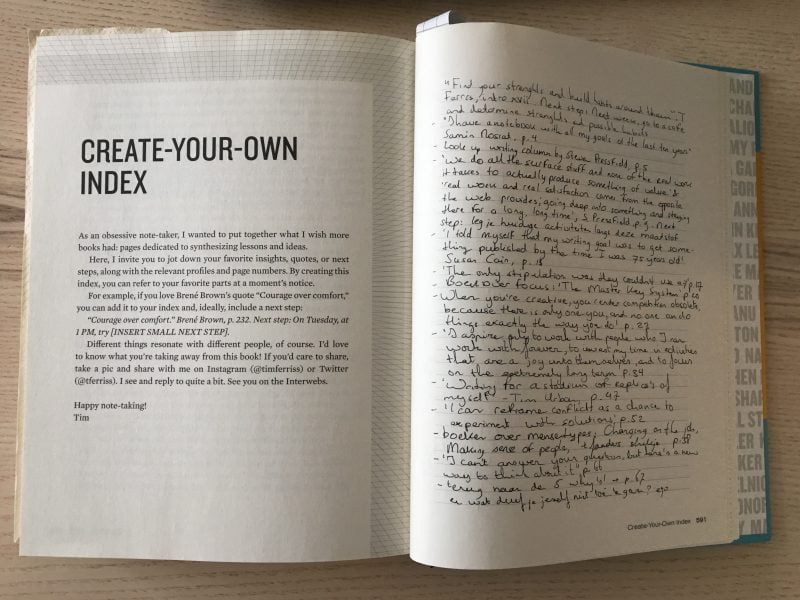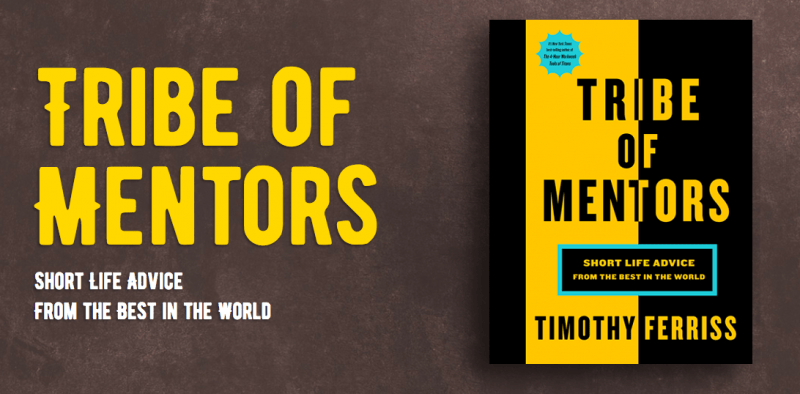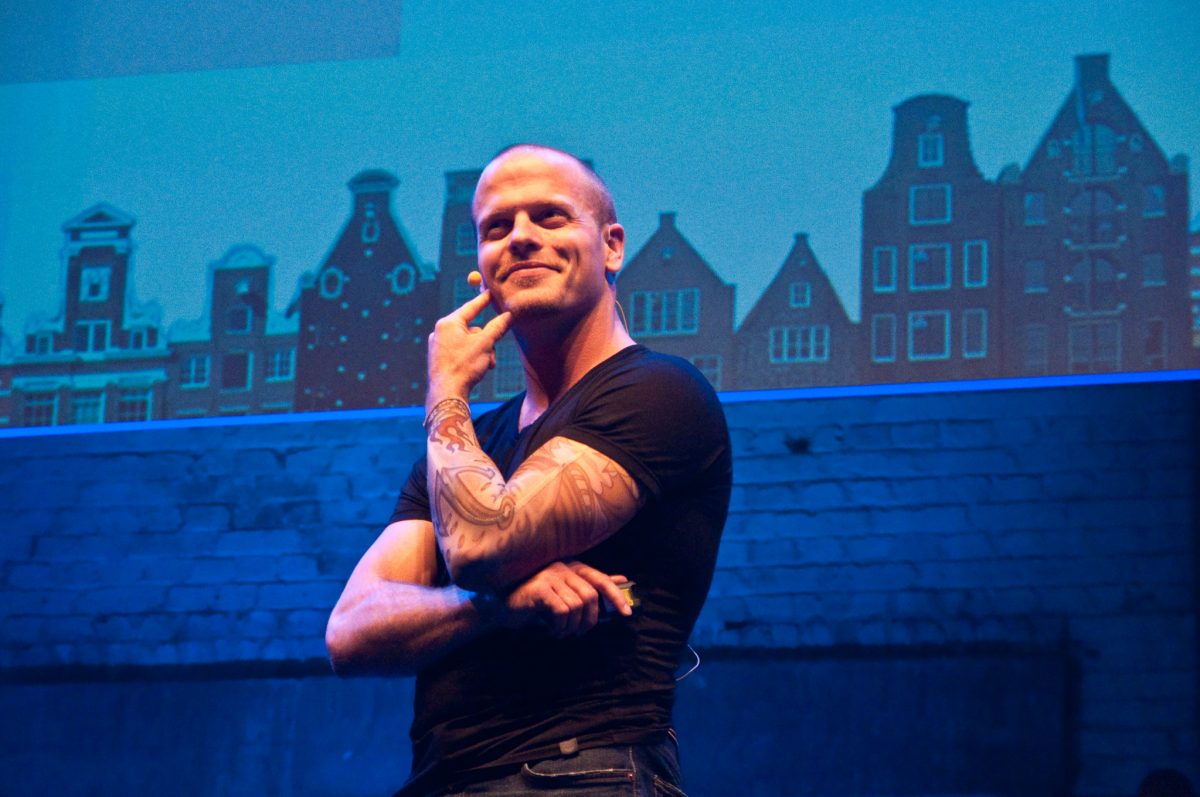Tim Ferriss vroeg aan tientallen indrukwekkende mensen – van Esther Perel tot Yuval Noah Harari – om kort levensadvies. De antwoorden bundelde hij eind 2017 in een vuistdikke bloemlezing: Tribe of Mentors (bekijk op Bol.com). Hieronder volgen mijn notities.
Die hield ik trouwens achterin het boek bij. Ferriss geeft lezers daar de mogelijkheid om een alternatieve inhoudsopgave te maken:

Een mooi idee, wat ik nu toepas bij elk non-fictieboek dat ik lees.
Een korte disclaimer voor je begint met het scannen van onderstaande adviezen: de charme van Tribe of Mentors is dat iedereen iets anders uit het boek kan halen. Wat volgt, zijn adviezen die voor mij relevant zijn – bijvoorbeeld omdat ik nu ergens mee worstel of naar streef. En misschien waren sommige adviezen voor mij al bekend, maar voor jou nog heel relevant. Dus ga het boek vooral ook zelf doornemen.
De paginanummers verwijzen naar de Engelstalige hardcover-editie.
Deze lessen haalde ik uit Tribe of Mentors

Oké, dit is een beetje inception, want het eerste citaat is een citaat uit het vorige boek van Ferriss (Tools of Titans – korte bespreking hier). Maar ik vond het zo’n goede leidraad voor alles wat volgt, dat ik het fragment toch weer deel. Over het naar Grote Voorbeelden kijken, schrijft Ferriss:
The superheroes you have in mind (idols, icons, billionaires, etc) are nearly all walking flaws who’ve maximized one or two strengths. Humans are imperfect creatures. You don’t “succeed” because you have no weaknesses; you succeed because you find your unique strengths and focus on developing habits around them.
Dus stel jezelf de vraag: wat zijn mijn sterke kanten en hoe kan ik die met dagelijkse gewoontes maximaliseren?
En: wat zijn mijn zwaktes, en hoe beïnvloeden die mijn werk en persoonlijk leven? Zoals topinvesteerder Ray Dalio zegt op op pagina 323:
Love looking at what you don’t know, your mistakes, and your weaknesses, because understanding them is essential for making the most of your life.
Over nee-zeggen:
Chefkok Samin Nosrat heeft een notitieboek waarin hij al tien jaar lang zijn doelen (groot en klein) bijhoudt. Af en toe bladert hij erin. Ook als hij een uitnodiging krijgt, en hij twijfelt of het verstandig is erop in te gaan. Door zo met zijn doelen geconfronteerd te worden, kan Nosrat beter een beslissing maken. p.4.
Atleet Kyle Maynard vertelt hoe een succesvolle CEO hem ooit zijn aannamebeleid toevertrouwde (p. 17):
When his company grew and he ran out of time to interview people himself, he had his employees rate new candidates on a 1-10 scale. The only stipulation was they couldn’t choose 7. It immediately dawned on me how many invitations I was receiving that I would rate as a 7 – speeches, weddings, coffees, even dates. If I thought something was a 7, there was a good chance I felt obligated to do it. But if I have to decide between a 6 or an 8, it’s lot easier to quickly determine whether or not I should even consider it.
Maar zeg niet altijd ‘nee’ tegen dingen die op het eerste gezicht een 6 of lager lijken, ook al lijkt dat verstandig. Socialemediagoeroe Gary Vaynerchuk is een drukbezet man, maar zegt dan soms toch ja:
I still need a healthy balance of 20 percent yeses to things that seem dumb, because I believe in serendipity, and that’s an important balance that people struggle with.
Over focus:
Schrijfcoach Steven Pressfield (bekend van The War of Art) zegt:
Bad advice is everywhere. Build a following. Establish a platform. Learn how to scam the system. In other words, do all the surface stuff and none of the real work it takes to actually produce something of value.
En:
Real work and real satisfaction come from the opposite of what the web provides. They come from going deep into something – the book you’re writing, the album, the movie – and staying there for a long, long time.
Allebei op pagina 9.
Over geduld en een lange-termijn-blik (in plaats van gehaast en prestatiedruk):
I told myself that my writing goal was to get published by the time I was 75 years old. I wanted writing to be a permanent source of pleasure, and never to be associated with financial stress, or, more generally, the pressure to achieve.
Susan Cain (bekend van haar boek over introverte mensen: Stil) op pagina 13.
Over de ideale lezer:
Tim Urban – bekend van Wait But Why en zijn leerzame Elon Musk-essays – vertelt hoe op pagina 47 hij zijn ongrijpbare blog begon:
I started out basically imagining I was writing for a stadium full of replicas of myself – which made things easy because I already knew exactly what topics interested them, what writing style they liked […] I ignored the conventional wisdom that online articles should be short, frequent, posted consistently – because I knew the Tims in that stadium didn’t care about those things – and instead focused on a single type of topic. And it worked. Four years later, many of those people who happen to like my type of writing have found me.
Over omgaan met obstakels en bijbehorende stress:
I strive to find calm, measured responses and to see hindrances as a chance to problem-solve. Often I fall back into old frustrations, but if I remind myself, this is a chance to step up, I can reframe conflicts as a chance to experiment with solutions.
Zegt fysicus Janna Levin op pagina 52.
En een hele belangrijke observatie van komiek Whitney Cummings op pagina 483:
The problem won’t be around in a year, but my reputation of how I dealt with it will.
Zit je te piekeren? Stel jezelf de volgende vraag:
Would it help?
Over de oprichter onder de mede-oprichters:
A European management consultant studied hundreds of start-ups and realized that even when there are multiple “co-founders”, there is always a single “source”: the person who took the first risk on a new initiative. That source maintains a unique relationship with the gestalt of the idea and has an intuitive knowledge of what the right next step for the initiative is, whereas others who join later to help with the execution often lack that intuitive connection to the founder’s original insight. Many organizational tensions and power struggles often revolve around lack of explicit acknowledgment of who the source of the initiative is.
Investeerder Graham Duncan op pagina 59.
Tegeltje over geluk:
Make sure you have something to look forward to every day.
Aldus schrijver en filmmaker Soman Chainani op bladzijde 73.
Over zingeving – en werken voor iets groters:
Rabbijn Jonathan Sacks nam een besluit waar hij veel kritiek op kreeg vanuit geloofsgemeenschap (toenadering zoeken tot moslimleiders na 9/11). Hij betrok dat eerst op zichzelf totdat…
There was a 180-degree shift in my understanding of the nature of what I was doing. It wasn’t personal at all; there was no self involvement here. It’s about what you stand for, and the people that you care about. From that moment of, I became, in a sense, invulnerable, because I was no longer putting myself on the line.
Over mediageniek werk en belangrijke saaie beslissingen:
“Beware the investment activity that produces applause; the great moves are usually greeted by yawns.”
Dixit Warren Buffet (geciteerd door Jason Fried op pagina 205).
Denk aan je omzet
If you bootstrap, you’ll be forced to get good at making money. If there’s one habit or skill that an entrepreneur should practice, it’s making money. So force yourself into it.
Aldus softwareondernemer Jason Fried op pagina 208. En Tim O’Reilly zegt op bladzijde 219:
Money in business is like gas in your car. You need to pay attention so you don’t end up on the side of the road. But your trip is not a tour of gas stations.
Over het gevaar van disruptie:
The idea that we should focus on disruption rather than the new value that we can create is at the heart of the current economic malaise, income equality, and political upheaval.
Wijze en ware woorden van uitgever Tim O’Reilly (die de term Web 2.0 bedacht) op pagina 223.
Over de streven naar (en de waarde van) zorgvuldigheid:
We worden tegenwoordig aangemoedigd GROOTS te denken en een visie uit te dragen. Tom Peters, schrijver van In Search of Excellence komt met een aardig tegengeluid op pagina 228:
I say: Think small. Do something super cool by the end of the day! I write about “excellence.” Most see excellence as some grand aspiration. Wrong. Dead wrong. My two cents: Excellence is the next five minutes or nothing at all. It’s the quality of your next five-minute conversation. It’s the quality of, yes, your next email.
Dit doet me denken aan wat de beroemde restaurateur Danny Meyer in zijn boek Setting the Table schrijft. Hij roemt daarin de ‘excellence reflex’: probeer in alles wat je doet – tot het schrijven van je mailtjes aan toe – zorgvuldig te zijn. Dat dwingt je ook tot focus, want je kunt niet alles doen als het zorgvuldig moet gebeuren.
Brené Brown zegt hier op pagina 234 ook iets relevants over. Zij dacht als manager alleen bij de Grote Dingen betrokken te moeten zijn. Maar ze leerde dat heel waardevol en belangrijk is om ook op de werkvloer naar ‘excellence’ te blijven streven:
The real work [as a leader] is the constant iteration, incorporating consumer feedback, troubleshooting, figuring out when to push and when to bail, and helping everyone reset after a setback and learn. I want and need to be involved in all of that.
En op het vlak van persoonlijke ontwikkeling zegt schaakgrootmeester Maurice Ashley op pagina 370 het volgende:
Greatness is a verb. Greatness is not a final destination, but a series of small acts done daily in order to constantly rejuvenate and refresh our skills in a daily effort to become a better version of ourselves.
Origineel idee van Kevin Kelly over het weggeven van ideeën:
I try to give my best ideas away in the hope that someone will do them, because if they do them, that means I was not the only one who could have.
Op pagina 249.
Over het ochtendritme van Mr. Money Mustache:
I came to realize that the key to a great life is simply having a bunch of great days. So you can think about it one day at a time. And it turns out there are some pretty simple buttons you can press to give yourself a great day. Start by waking up from a good sleep, eating good food, leaving your phone/newspaper/computer behind, and simply writing down your plan for what will make the day great. Several hours of physical activity, some hard work, a chance to laugh with and help out other people – and you’re pretty much there.
Op pagina 377.
Ik moest daar weer aan denken toen ik dit citaat van Ralph Waldo Emerson tegenkwam:
To laugh often and much; To win the respect of intelligent people and the affection of children; To earn the appreciation of honest critics and endure the betrayal of false friends; To appreciate beauty, to find the best in others; To leave the world a bit better, whether by a healthy child, a garden patch, or a redeemed social condition; To know even one life has breathed easier because you have lived. This is to have succeeded.
En daarmee sluit ik mijn notities af.
Wil je Tribe of Mentors ook lezen? Je vindt het op bol.com of in je plaatselijke boekhandel.
Wil je weten welke boeken je volgens mij niet mag missen? Elke maand stuur ik aan vrienden mijn boekentips rond.

